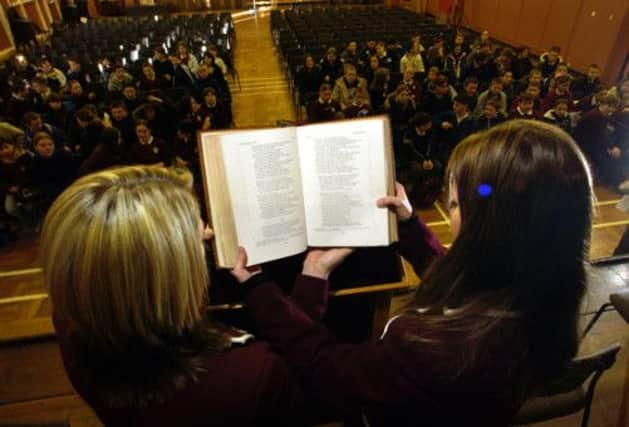Accept those benefits worship offers


AS A person of religious faith and an educator for almost 40 years, I should be happy that the subject of religion in schools features regularly in the media. Recent news items have reported parental concerns about the teaching of Creationism, the right to withdraw children from religious observance, the purpose of religious education in schools and the contribution of faith representatives on local government education committees.
While happy to see such issues being aired and debated, I have been disappointed at the sensationalist tone of much of this coverage. I fear that, rather than casting light on important issues, some coverage has misrepresented the role of the Churches, caricatured the significance of religion in schools and misinformed the public. This is not conducive to mature discussion and debate. Let me offer an alternative perspective.
Advertisement
Hide AdAdvertisement
Hide AdReligious observance in all schools – properly planned and executed – offers enrichment to the experience of young people. It recognises the spiritual dimension of pupils and addresses important aspects of their emotional wellbeing. It provides time and space for a school community to celebrate its achievements, hopes and aspirations, and to honour its traditions and culture. Responsibility for planning and delivery lies with each school and best practice involves pupils, teachers, pupils and parents in sharing this responsibility.
Traditions
Given our traditions in Scotland, it is appropriate that religious observance in all schools draws largely upon the rich traditions of Christianity and the skills of local Christian ministers. The wisdom of the Christian tradition provides great insights into the human condition which can benefit people of all faiths and none. Such insights are offered and not imposed on any child, of course. Christianity respects the freedom of individuals to make their own decisions. No Christian Church representative is interested in the “indoctrination” of children, as some have suggested.
In Catholic schools, of course, the practice of religious observance is characterised by particular attention to the traditions, customs and practices of the Roman Catholic Church which nourish the spirituality and faith of the individual and of the community. Prayers and devotions recognise the sacred presence of the living God, whom we recognise as Father, Son and Holy Spirit. We pay due regard to the Church’s liturgical calendar which celebrates certain festivals, seasons and saints. On significant occasions, pupils participate in religious services, including the celebration of Holy Mass, either in school or in the nearby parish church. Parents are informed about these occasions and often invited to join the celebrations.
Advice from the Scottish Government while upholding the parental right to withdraw children from these activities, recognises that in a Catholic school religious observance is intricately bound to the ethos and practice of the school:
Where a parent chooses a denominational school for their child’s education, they choose to opt in to the school’s ethos and practice which is imbued with religious faith and religious observance. In denominational schools, it is therefore more difficult to extricate a pupil from all experiences which are influenced by the school’s faith character.
Learning experience
Religious education, when it is well taught, also offers enrichment to the learning experienced by young people in schools. Young people tell us that it provides time and space for them to address the big questions in their lives – to explore their origins and their destinies, to learn how religious traditions and rituals, sacred texts and symbols can help them to make sense of the mysteries of life, to reflect on significant moral decisions and ethical challenges which face them in today’s world. Religion, when it is learned about in this way, isn’t “absurd” or “irrational”, as some make it out. It is absolutely relevant and contemporary. Religion is also not opposed to science, despite what some celebrity atheists would have you believe. It is perfectly possible to believe in the truth of God being the creator of all life and to accept the facts which led to Darwin’s theory of evolution.
Religious belief – certainly that of the Catholic Christian tradition – is inclusive of these complementary insights into human life. Of course on some issues, such as the ethical implications of cloning or euthanasia, we may wish to offer scientists a perspective which emerges from our particular understanding of the sanctity of all human life. But, in doing so, we are not attempting to block the scientific pursuit of improvements.
I appeal to the secular groups making a determined effort to remove religion from our schools to be similarly inclusive and to stop mis-representing the role of the churches in education. Recent claims that council education committees are being unduly influenced by church representatives are absurd. I would ask them to be gracious in recognising the positive contribution of people from various churches who play a legitimate part in civil society by serving local communities. They are all committed to serving the common good; for this, they deserve respect not contempt.
• Michael McGrath is director, Scottish Catholic Education Service